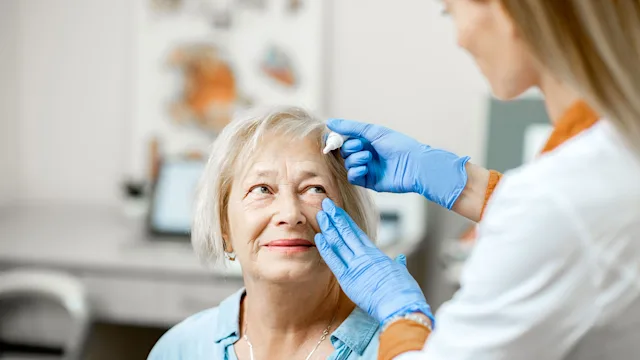Key takeaways:
Optometrists are the first line of care for your eye health. They perform routine eye exams, prescribe corrective lenses, and know when a person needs to see an ophthalmologist.
Ophthalmologists are medical doctors that specialize in the care of more complex eye disorders and perform eye surgery if required.
Optometrists and ophthalmologists often work together in the same office and collaborate to provide good, cost-effective eye care.
When it’s time for your annual eye exam, do you need to see an optometrist or an ophthalmologist? What’s the difference between an optometrist and ophthalmologist, and does it matter which you choose? The answer depends on why you’re seeing an eye doctor. Here’s information to help you decide when you need to see an optometrist or an ophthalmologist.
What is an optometrist?
Optometrists are doctors of optometry. They graduated from a 4-year college and completed a 4-year training program in optometry. Some go on for specialized training, but most optometrists go into practice after their training is done.
Optometrists are generally regarded as primary care providers and the gatekeepers of your eye health. The care services that optometrists provide include:
Performing comprehensive eye exams
Diagnosing common eye problems
Prescribing corrective lenses, including contact lenses
Treating minor eye injuries
Search and compare options
Some states allow optometrists to prescribe medications as well. Depending on the severity of an eye problem or injury, an optometrist may refer to a specialized optometrist or an ophthalmologist.
Optometrists can specialize in many different areas of eye care, including:
Pediatric optometry
Geriatric optometry
Vision rehabilitation
Brain injury rehabilitation
Glaucoma
Ocular diseases
What is an ophthalmologist?
Ophthalmologists will either be a doctor of allopathic medicine (MD) or osteopathic medicine (DO). This means they have graduated from a 4-year college and completed 4 years of medical school. They also have completed a 4-year residency that teaches them about general medicine and eye diseases. During this time, they learn to perform surgery on the eye, too. Some go on to focus on specific eye diseases with added training called a fellowship.
While ophthalmologists do perform annual exams, they spend most of their time providing more specialized eye care.
What is the difference between optometrists and ophthalmologists?
Aside from their training, the real differences between optometrist and ophthalmologists lie in what each type of eye-care provider can (and can’t) do. Here’s a quick guide.
Read more like this
Explore these related articles, suggested for readers like you.
Optometrist | Ophthalmologist | |
Training | College and 4 years of optometry school | College and 4 years of medical school |
Advanced training | 1-year residency (optional) | 4-5 years of residency (mandatory) plus fellowship years (optional) |
Performs yearly eye exams | Yes | Yes |
Diagnoses eye conditions (glaucoma, cataracts) | Yes | Yes |
Prescribes glasses or contacts | Yes | Yes, but often defers this to the optometrists |
Monitors eye problems that can develop from medical conditions like diabetes or autoimmune conditions | Yes | Yes |
Treats eye conditions with injectable medications and other advanced treatments | No | Yes |
Performs surgery like LASIK, cataract surgery, glaucoma surgery | No | Yes |
Provides pre- and post-surgical care | Yes | Yes |
Conditions treated by both optometrists and ophthalmologists
Optometrists and ophthalmologists treat some similar eye conditions. Who you see depends on how severe the problem is, with whom you feel more comfortable, and who you have access to where you live.
Near- and far-sightedness
Vision problems, such as nearsightedness (myopia) and farsightedness (hyperopia), are the most common reasons to see an eye doctor. Both optometrists and ophthalmologists can diagnose these conditions and prescribe corrective lenses (eyeglasses or contacts). Most ophthalmologists don’t do this work if they’re doing more specialized eye care. It’s best to ask the ophthalmologist’s office if the doctor provides this service before making an appointment.
Eye conditions
Optometrists may be the first to diagnose an eye condition and start treatment before sending someone to see an ophthalmologist. Optometrists and ophthalmologists work together to treat eye conditions like:
Strabismus (cross-eye)
Optometrists may start out treating a condition and then ask an ophthalmologist to join in when a person needs more advanced care, like specialized medications, procedures or surgeries, or when their eye condition is getting worse. Optometrists also pick out people at high risk for vision loss from eye conditions and refer them to ophthalmologists so they can start treatment sooner.
When is it better to see an ophthalmologist?
Sometimes, it’s necessary to go straight to an ophthalmologist for eye care.
For example, get ophthalmological care if you:
Have more advanced or complicated eye conditions
Need specialized studies to diagnose eye problems
Need eye surgery including cataract surgery and LASIK
Have medical conditions that can also cause eye problems, like diabetes, high blood pressure, or autoimmune diseases
Have certain eye problems only seen in children
Need reconstructive surgery to correct problems with the structures around the eye
Have a sudden change in your vision
Sudden changes in eye symptoms
New and sudden changes in your vision always need medical attention. Developing any of these eye symptoms should prompt you to make an appointment with an ophthalmologist:
Distorted vision
Decreased or blurry vision (even if temporary)
Double vision
Excessive tearing
Loss of peripheral (side) vision
Halo (color circle) around vision
New floaters (black circles) or flashes of light in vision
Accessing eye care
Where you live and whether you have healthcare coverage may also play a role in whether you see an optometrist or ophthalmologist for your eye health.
Location
There are more optometrists than ophthalmologists in the U.S. Ophthalmologists are usually located in larger cities and associated with academic medical centers. In many states, optometrists have more advanced training in order to provide more specialized care. With this training, studies show that optometrists make similar recommendations as ophthalmologists.
Cost and coverage
Health insurance covers most eye care provided by ophthalmologists, though deductibles and copays will apply. Some people purchase vision insurance to help with costs of routine eye exams, eyeglasses, and contact lenses. Some flexible spending accounts (FSA) or health savings accounts (HSA) cover vision-related expenses including:
Routine eye exams
Prescription eyeglasses and contact lenses
LASIK surgery
Eye-care accessories like contact lens solution
Eye drops and other eye medications
Your plan information will include details on which eye-care products are eligible for FSA or HSA.
How do optometrists and ophthalmologists work together?
Optometrists are the first line of care for your eye health. They can help with routine eye conditions and know when to have you see an ophthalmologist. Many times, optometrists and ophthalmologists work together in the same office.
Studies have shown that care can be more appropriate and cost-effective when optometrists and ophthalmologists work together. One study found that by working together, ophthalmologists and optometrists can use healthcare resources more wisely, which benefits everybody.
Projects like ECHO (Extension for Community Healthcare Outcomes), in which optometrists learn from each other and ophthalmologists, help reduce unnecessary visits to ophthalmologists so that they can be available to help people who need more specialized eye care.
How does an optician fit into the eye-care team?
An optician is usually the first and last person that you’ll see in the eye-care team. They often help with appointments and are involved in customer service. They’re also specialists in eyewear and can interpret the prescriptions written by the optometrist and ophthalmologist so that you can get your glasses. Training for opticians varies, but most opticians have training and have obtained an optician certificate or completed an apprenticeship under an optometrist or ophthalmologist.
The bottom line
Your eye care starts with deciding whether to see an optometrist versus an ophthalmologist. This can be easy if you understand the differences between an optometrist and ophthalmologist. Often, they work together to ensure that you have healthy eyes, and who to see depends on what you need. For a general eye exam and eyeglass prescriptions, an optometrist is the right place to start. Optometrists may refer you to an ophthalmologist if you need specialized care or surgery. This collaboration can be cost-effective and provide optimal care for your eyes.

Why trust our experts?


References
American Association for Pediatric Ophthalmology and Strabismus. (2019). Difference between an ophthalmologist, optometrist and optician.
American Optometric Association. (n.d.). What’s a doctor of optometry?
Association of Schools and Colleges of Optometry. (n.d.). What is an optometric residency?
Bartlett, R., et al. (2020). Agreement between ophthalmologists and optometrists in the certification of vision impairment. Eye.
Becker’s healthcare. (2012). 10 statistics and facts about ophthalmology and ophthalmologists.
Churchill, J., et al. (2022). What is an ophthalmologist? American Academy of Ophthalmology.
Harthan, J. S., et al. (2016). Diagnosis and treatment of anterior uveitis: Optometric management. Clinical Optometry.
Ly, A., et al. (2016). Collaborative care of non-urgent macular disease: A study of inter-optometric referrals. Ophthalmic and Physiological Optics.
Miller, D. D., et al. (2020). Differences in characteristics of Medicare patients treated by ophthalmologists and optometrists. Public Library of Science One.
Sprabary, A. (2019). What can I spend FSA dollars on? All About Vision.
Todd, D., et al. (2020). Agreement in clinical decision-making between independent prescribing optometrists and consultant ophthalmologists in an emergency eye department. Eye.
Violato, M., et al. (2016). Cost-effectiveness of community versus hospital eye service follow-up for patients with quiescent treated age-related macular degeneration alongside the ECHoES randomised trial. British Medical Journal Open.
Williams, M., et al. (2018). Creating a virtual community of practice: An evaluation of ophthalmology-optometry Project ECHO. Eye.
















